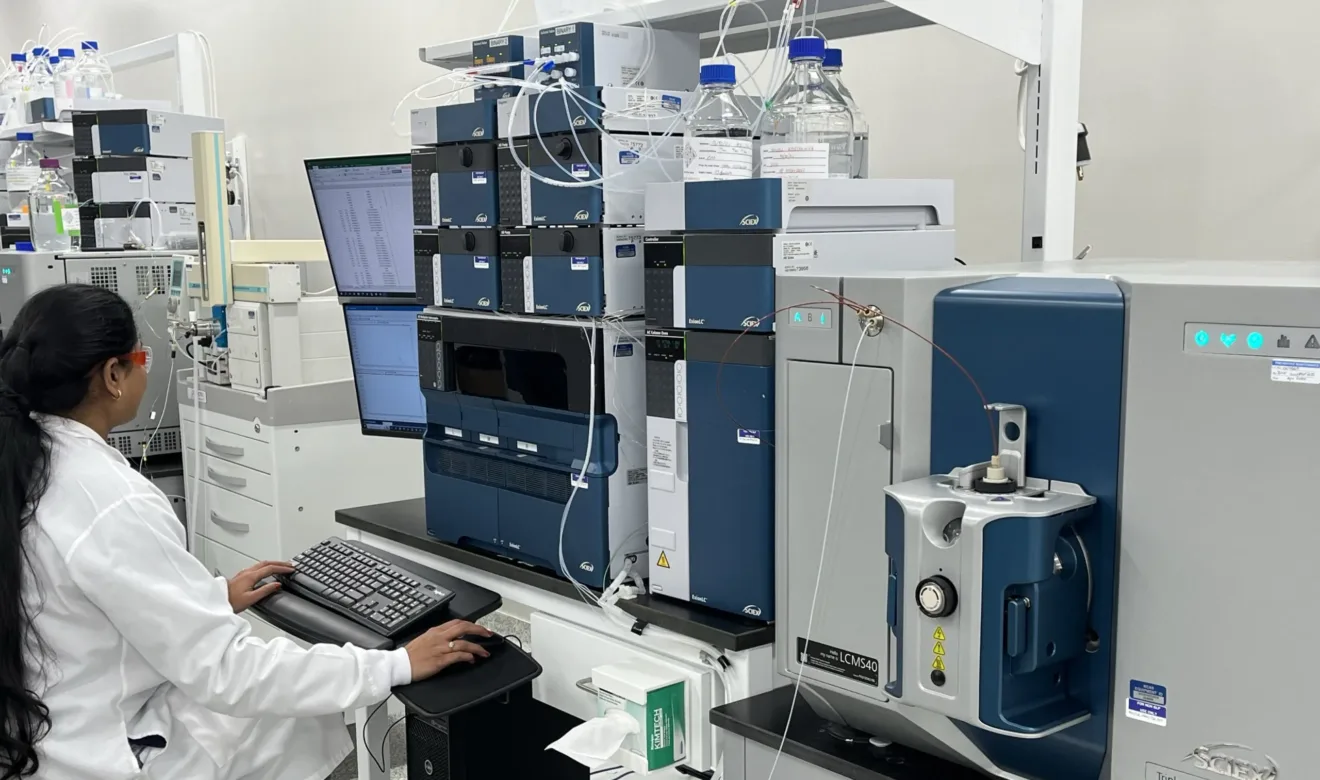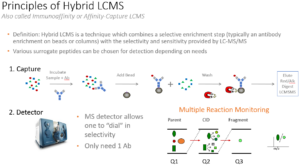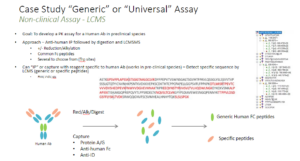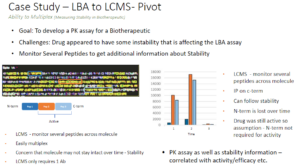
Hybrid LC-MS/MS
Hybrid LC-MS/MS is an analytical technique which combines an enrichment step with the selectivity and sensitivity provided by LC-MS/MS.

A track record in Hybrid LC-MS/MS
KCAS Bio is an industry leading expert in Hybrid LC-MS/MS – also known as immunoaffinity or affinity capture LC-MS – with experts in the field who have pioneered this technology for the last 25 years. Hybrid LC-MS is an excellent complimentary approach to ligand binding assays (LBAs). KCAS Bio is a strong advocate of assessing the relative merits of available technologies to answer a project’s needs and using that decision to drive project support.

Principles of Hybrid LC-MS
Hybrid LC–MS only requires one antibody, whereas a typical LBA technique will require two. Following affinity capture, it is common to include a digestion step to produce surrogate peptides, which are representative of the protein of interest and are used for quantitation. The overall process takes advantage of the combined selectivity of the extraction and the flexibility of tandem mass spectrometry to differentiate the analyte from other potential interferents. Our highly experienced scientists use appropriate state-of-the-art technologies as needed to best support all aspects of large molecule bioanalysis which include multidimensional chromatography (high flow to micro flow), bead based enrichments using automated platforms such as KingFisher Flex or other liquid handling instrumentation, anti-protein and online custom anti-peptide antibody enrichments platforms (columns/beads) coupled with high sensitivity MS instrumentation (SCIEX 7500s and SCIEX 6500s).

An in-depth look at Hybrid LC-MS
Why Hybrid LC-MS/MS
Hybrid LC-MS/MS approaches are increasingly being utilized to support complex biotherapeutic modalities and can be a great alternative to ligand binding assays. Combining the principles of ligand binding for target analyte enrichment with LC-MS/MS provides an alternative platform for quantitation of large molecules and in some cases becomes the preferred approach. LC-MS/MS can provide significant advantages to quantitate large molecules and at KCAS Bio, we have seen a number of examples where LC-MS/MS provided a clear path forward when an LBA approach met significant hurdles. KCAS Bio has supported many modalities using Hybrid LC-MS/MS including Antibody Drug Conjugates (ADCs), mAbs, Fusion proteins, Bi- or Tri-specifics, antibody fragments (Fab, ScFc, etc) and more recently Antibody Oligo Conjugates (AOCs). Hybrid LC-MS/MS is becoming the technology of choice for many ADCs or AOCs.
Hybrid vs Traditional LC-MS/MS
The main difference in Hybrid vs Traditional LC-MS quantitation is the lack of an immunoprecipitation (IP) or enrichment step with critical reagent needed in traditional LCMS. Traditional LC-MS/MS typically involves direct protein digestion (from matrix) followed by a post digestion clean up like solid phase extraction (SPE) or other sample prep cleanup step at the peptide level. This approach is advantageous when there are not good reagents available for LBA or Hybrid strategies. The addition of an enzymatic digestion to produce a range of characteristic peptides provides surrogates that are more compatible with the mass range of many quantitative MS instruments.
Tell us how we can help with your project.
Considerations for incorporating Hybrid LC-MS/MS
1. Generic mAb PK by Hybrid LC-MS/MS – A good example is how we’ve changed our approach to help early discovery work. Similar to using ligand binding assays for generic mAb detection, we have developed a generic approach for quantitating human mAbs in non-clinical species. This means we have very limited development time as we move between different projects enabling rapid data delivery. We can test a new construct and run a batch of samples many times within 1-2 weeks from start to finish. Generally, we focus on Fc peptides but we can add additional more specific regions of the antibody as well and get even more useful data at the same time.

2. The additional flexibility in not being tied to a particular binding site for hybrid LC-MS/MS can also be used to give valuable structural information. During a recent LBA study we identified instability in a biological analyte that interfered with the LBA assay quantitation. Pivoting to hybrid LC-MS/MS, we identified unique peptides at the N-terminus, C-terminus and the center of the molecule. Monitoring those peptides over time we were able to identify the specific region of the molecule that was associated with instability. Furthermore, we were able to confirm that the activity of the therapeutic was not affected by instability in that region.

ADCs and Hybrid LC-MS/MS Technology
KCAS Bio is focused on applying our LC-MS expertise to be at the forefront of the industry to help address our customers’ analytical challenges. Hybrid LC-MS/MS is proving to be an increasingly valuable tool for delivering answers about complex analytes such as antibody drug conjugates (ADCs) to enhance the drug development process.

Our people
Related services

Bringing technical innovation to time-critical research
KCAS Bio partners with leading technology providers so our scientists and clients have access to gold-standard, cutting-edge technologies.